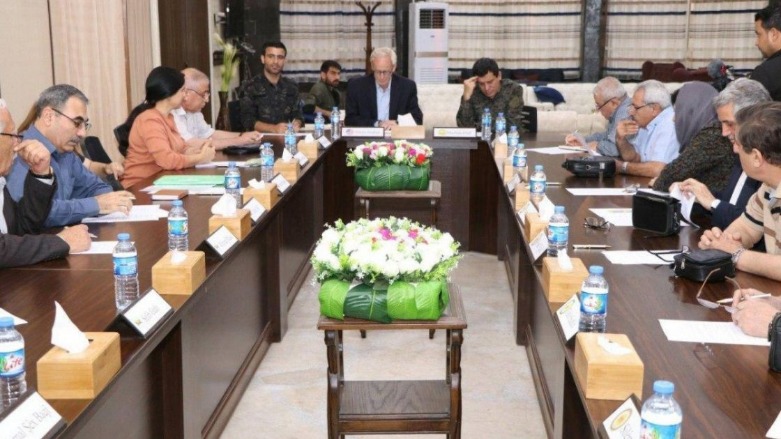Syrian Kurdish parties agree on Supreme Kurdish Reference

ERBIL (Kurdistan 24) – The leading Kurdish political forces in Syria have recently agreed to form a Supreme Kurdish Reference that will decide on the political strategy of the Kurdish movement in Syria. However, discussions will continue and no final agreement has yet been reached.
The Kurdish National Unity Parties (PYNK) and the Kurdish National Council (KNC) have been holding Kurdish unity talks with support from the United States for seven months now.
The PYNK is an umbrella entity composed of groups allied to the Democratic Union Party (PYD), the political wing of the People’s Protection Units (YPG), which spearheads the US-allied Syrian Democratic Forces (SDF).
However, no public press conference or statement was released, such as on June 17, when the two Kurdish blocs said they reached an initial deal and talks would continue based on an agreement they arrived at in the Kurdistan Region’s Duhok province in 2014 in the presence of Ambassador William V. Roebuck, the top American diplomat in northern Syria.
A final statement would only be made when the two sides agreed on all points including the Political Reference, Security, and Self-Administration.
Read More: Syrian Kurdish opposition party says no final agreement on Kurdish unity yet
PYD spokesperson Sama Bekdash told local media in northern Syria on Monday that the two sides agreed on the Supreme Kurdish Reference, including six political points, which include the formation of a Kurdish strategy, to work for the return of civilians displaced by the Turkish invasions of Afrin, Serekaniye, and Tal Abyad, the representation of Kurds in Syria, and how to protect the achievement of Syrian Kurds in Syria.
She added that the Supreme Kurdish Committee would include 16 members of the PYNK, 16 from the KNC, with a remaining eight being independent figures or other parties outside of the framework, four of which would be decided by the KNC and four by the PYNK.
Nashat Zaza, a member of the central committee of the Kurdistan Democratic Party – Syria (PDK-S), the leading party within the KNC, told Kurdistan 24 on Saturday there are “agreements but also obstacles which are delaying the process.”
“We do not want these differences to have a negative effect on the public,” Zaza added. “The overall goal is that we secure a deal which will serve the interests of our homeland and our people.”
Ibrahim Biro, a member of the Foreign Relations Committee of the KNC, told Kurdistan 24 on Sunday that “to date, the positive thing is that the US is present in all the meetings between the two parties.” However, he said disagreements between the two sides continue and need to be resolved.
Furthermore, he noted that it is a “natural right for the Roj Peshmerga to return to their homeland.” The SDF and the YPG in the past have refused the return of the Rojava Peshmerga, the military wing of the KNC.
Read More: Thousands of Rojava Peshmerga prevented from battling IS in Syria
Nevertheless, Biro added that “good steps have been taken with respect to the political reference. Therefore, moving forward, we have to work on the points of disagreements and find solutions.”
However, he added that they expect the US to convince Turkey to accept a future Kurdish unity agreement. “We know that Turkey has not expressed strong disagreement, but it is clear for us, our people, and the media that Turkey is not happy with this process,” he said.
Turkey is sending “messages with [a] soft tone of dissatisfaction with regards to the [dialogue] process,” he continued, adding the US can help convince Turkey “when an intra-Kurdish agreement is signed; if not, Kurdish regions of Syria will remain under threat.”
Tensions between the KNC and PYD increased following the outbreak of the Syrian civil war in 2011, with the latter playing a significant role in the establishment of the self-administration that has ruled northeastern Syria. The two sides have not successfully cooperated as had been hoped, in part because agreements they reached in Duhok and Erbil between 2012 and 2014 were never effectively implemented.
Yousif Ismael, Director of Policy and Media at the Washington Kurdish Institute, told Kurdistan 24 on Monday that it is essential for both sides to implement the agreement and translate it into actions.
“This will be significant for many reasons including having a strong Kurdish entity for internationally-sponsored constitution talks and because this agreement has the backing of the US and the EU counties such as France and more,” he said.
“The obstacles would be Turkey since we saw how they reacted to the Kurdish unity talks at its early stages. I think if Kurds follow through with this agreement truly, then they would overcome major issues, simply because of the backing by the west. The ball is in the Kurdish court.”
Editing by Karzan Sulaivany
